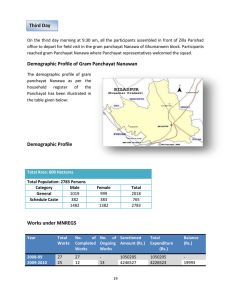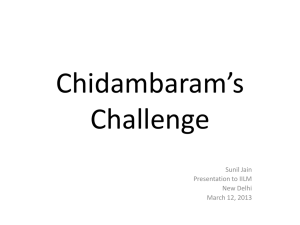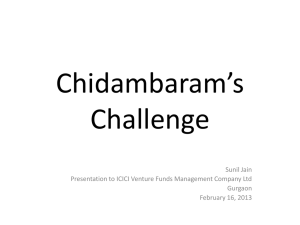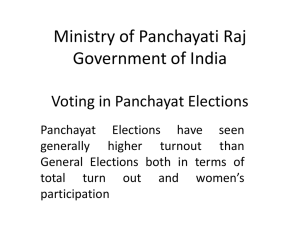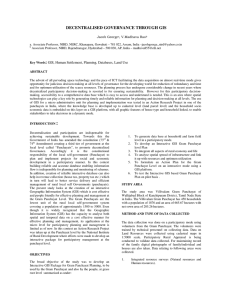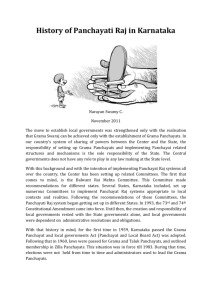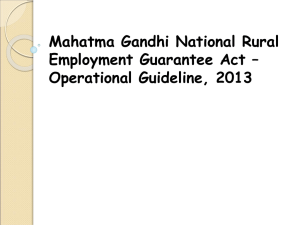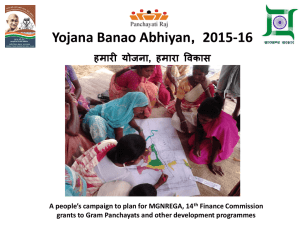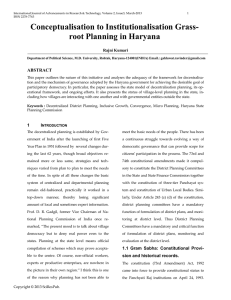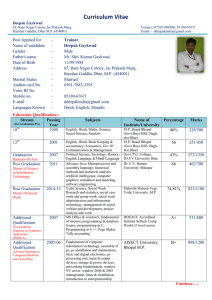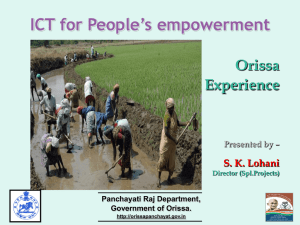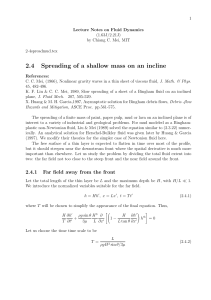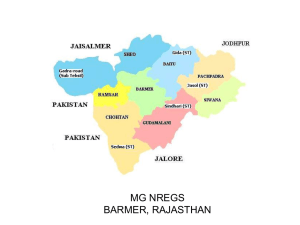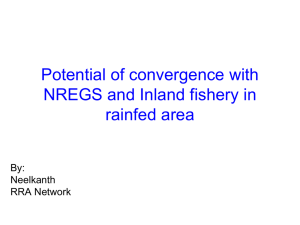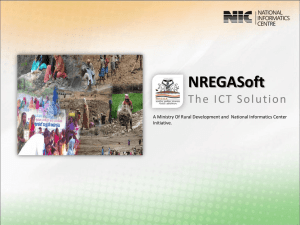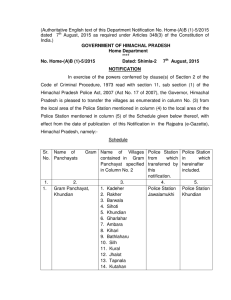Proposal for GP Capacity building
advertisement
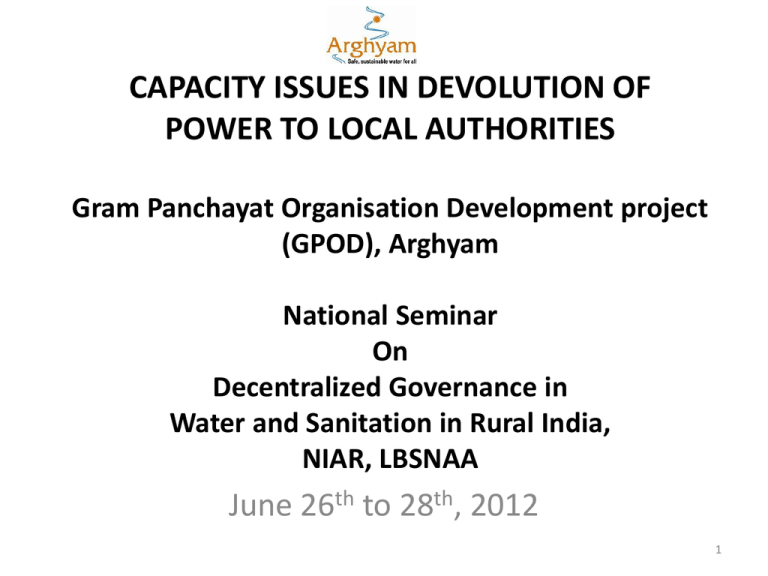
CAPACITY ISSUES IN DEVOLUTION OF POWER TO LOCAL AUTHORITIES Gram Panchayat Organisation Development project (GPOD), Arghyam National Seminar On Decentralized Governance in Water and Sanitation in Rural India, NIAR, LBSNAA June 26th to 28th, 2012 1 The directional foundation for a strong decentralized set-up has already been laid • 73rd Constitutional Amendment, 1992 has given us the legal framework for decentralization which not many countries can boast of, resulting in creation of 2.5 lakh odd Gram Panchayats across the country • Substantial financial outflows go directly to the GPs, such Central and State Finance Commission grants, RDPR grant, govt programmes such as MGNREGA, Ashraya Housing etc. Major Central Plan Assistance Programmes being implemented by or under GPs were to the tune of Rs.109052crs for 2010-11. • Each state has an SIRD, dedicated to capacity building of members and staff of Panchayati Raj Institutions (PRIs) • Constant efforts at strengthening the processes of planning, account keeping etc. – Integrated Planning manual, Panchtatra etc. Yet, there are miles to go before local authorities deliver the goods…. However, before we look at the performance of local authorities, it is key to ask “Have we designed the system for success?” 3 Arghyam’s Gram Panchayat Organisation Development (GPOD) project in Karnataka focuses on GP institution building Project objectives: 1. To develop a step by step framework for building a strong GP institution 2. To initiate a process of real time change in 2 Gram Panchayats in Karnataka, while implementing the above framework 3. To leverage local strengths and capacities. Project duration: Phase I: Diagnostic and design: Jan to Dec 2011 Phase II: Handholding planning and implementation: Jan to Dec 2012 4 Our partners • Programme Manager: Arghyam, Bangalore , a registered public charitable trust setup in 2001 with a personal endowment from Ms. Rohini Nilekani • GPs: O’Mittur (Kolar district) and Dibburhalli (Chikkaballapur district) • Our NGO partners: Grama Vikas (GV) and Foundation for Ecological Security (FES) • Advisor: Shri T R Raghunandan, Former Jt. Sec, Govt of India • HR consultants: Panarc Consulting Group, Delhi 5 Triple mandate of 73rd Amendment is increasingly becoming the responsibility of the GP, with funds allocation up to Rs.1crs p.a. Looking at how demand is placed, by default or design, accountability of service delivery lies with the elected members Drinking water Cleanliness ZP/TP Sec* Elected members of the GP PDS Housing Citizens Health Education Street lights ………. Conflict resolution * In the case of Karnataka, PDO has been introduced 6 What should the GP get, and what does it actually get…? Capacity building support 1-2 training programs in 5 years Financial & Technical support from line depts./ programs/schemes WHERE TO GO? WHAT TO EXPECT? Not compensated for time & resources Leadership influenced by reservation GP Member, mostly elected first time Government staff GP employed staff A lone Secretary, sometimes shared among two or more GPs To be paid out of GP’s own meager revenues 7 Are we creating the right incentives? Understanding different programs and schemes, efficient service delivery to citizens, building a strong institution, structured planning and implementation…. Taking over contracts, making the fast buck to compensate for election money and to plan for next elections, creating strong political protectors… 8 Let us look at different issues which the GP faces, and what needs to be improved Issues Non-clarity regarding exact nature of obligations and responsibilities of govt line departments Group of GP members responsible for implementation of devolved functions - no individual portfolios and scope for specializations Gram Panchayat members spend money out of their pockets for addressing issues such as street light replacement, broken taps etc. Specific issues such as correction of BPL list, decision on additional public taps, inadequacy of gramthana land etc. Large programs and schemes (NREGA, NRHM, NRDWM etc.) detail expectations from GP, in addition to those from citizens. No provision for compensation for discharging responsibility Little knowledge among GP members on various programs/ schemes/ responsibilities and powers What needs to be improved? Transparency in administrative system GP Institution buildingorganisation structure GP Institution building- imprest and other operational guidelines Clarity in decision making process and authority GP Institution building – structure and incentives to deliver responsibilities GP capacity building – need for targeted training I submit the tono re-engineer the This is not to sayneed thereisare capacity issuesbut they can be easier targeted and implementation framework to addressed ensure it with more administrative transparency at higher provides the structure and incentives for govt levels and better institutional design at GP institutions to perform level 10 We are working towards a stronger GP institution, using the Organisation Development (OD) framework Purpose of the GP: Vision and Mission Role clarity through Process Mapping, RACI* 1. 2. 3. Extensive citizen interaction through Participatory Rural Appraisal and Focus group Discussions 4. 5. 6. 7. 8. 9. 10. 11. 12. 13. 14. 15. 16. 17. Street Light maintenance Drinking water through piped water supply Cleanliness of roads and drains Procurement Complaint handling Greening the village Food security PDS Fixing Water tariff Preventive health NREGA Housing Education Revenue generation Protection of CPR Agriculture and Animal husbandry Planning * Roles - Responsibility Accountability, Collaboration and Information providing GP Organisation structure to deliver the purpose Extensive discussions with GP members, government officials, other elected members and experts Members empowered to perform and take decisions Handholding GP functioning in their new structure as they interface with the larger system 11 GPs have passed resolutions to accept this structure Grama Sabha/ Ward Sabha As it is.. Adhyaksha Production Standing Com Social Justice Standing Com PDO Amenities Standing Com Secretary Supplemented.. Head – Production fns Head – Social Justice fns Head – Amenities I fns Head – Amenities II fns Head -Capacity Building fns •Revenue Generation •Greening the village •Agriculture and animal husbandry •NREGA • PDS •Food Security •Complaint handling •Drinking Water- piped water supply •Cleanliness of roads and drains •Preventive health •Housing•Protection of CPR •Education Street light maintenance •Facilitating capacity building of heads, staff and members •Citizen profiling Heads to be supported by staff, members, Line departments and 61A Committees Heads can be selected from among the members or even from outside The response of GP has been exceedingly heartening… “By the end of my tenure, I aspire to achieve a level where there will be zero complaints” - Bharathi, GP Adhyaksha & Head, Social Justice I need to go over all the government circulars related to the Mid day Meal schemeVenugopal, Head- Social Justice Getting all the heads together was a challenge, in which case we had to meet them separately – Asha, Project Officer, Grama Vikas The first thing I need to do is to take stock of all assets in the GP- such as number of drains, drinking water borewells etc… Narasimha Reddy, Head- Amenities I “Earlier we would just go to the GP meeting and sign, now we have a sense of responsibility to work for the citizens and retain their trust in us (GP members)” – Muniyamma, woman GP member, Dibburhalli on behalf of other women 13 The framework potentially builds specialization as well as pushes for accountability from higher government levels • Each Head assumes accountability for a set of functions, interfacing with govt departments to fulfill the responsibility effectively • His/her knowledge of schemes/programmes/funds increases • This triggers more awareness and pushes for transparency and accountability from govt departments • Finally, state training efforts can become more targeted to build capacity Rather than creating another of cadre of Panchayat employees who may not be interested in living and working within the Panchayat, we are utilizing and enhancing skills of local people 14 However, this framework is not sustainable without a larger change 15 Recommendations for a stronger implementation framework involves other key institutions • Panchayati Raj authorities to review GP’s structure/ work processes to enable it to deliver its devolved as well as agency functions better, as a self governing unit • When the GP is functioning as an agency for service delivery, there should be a Service MoUs with the government line departments, clearly stating mutual responsibilities and obligations of both parties. GP should be paid a fee for such delivery 16 Recommendations for a stronger implementation framework involves other key institutions • Panchayati Raj authorities to create provision for compensation - GP to be able to compensate its members from its revenue (possible if GP’s revenue base is expanded and includes service fee mentioned above) • SIRDs to enable a demand driven knowledge support GPs to have a key role in deciding development effort of its members, staff and citizens. With members assuming specific responsibilities, more targeted development effort can happen. 17 Thank you 18

